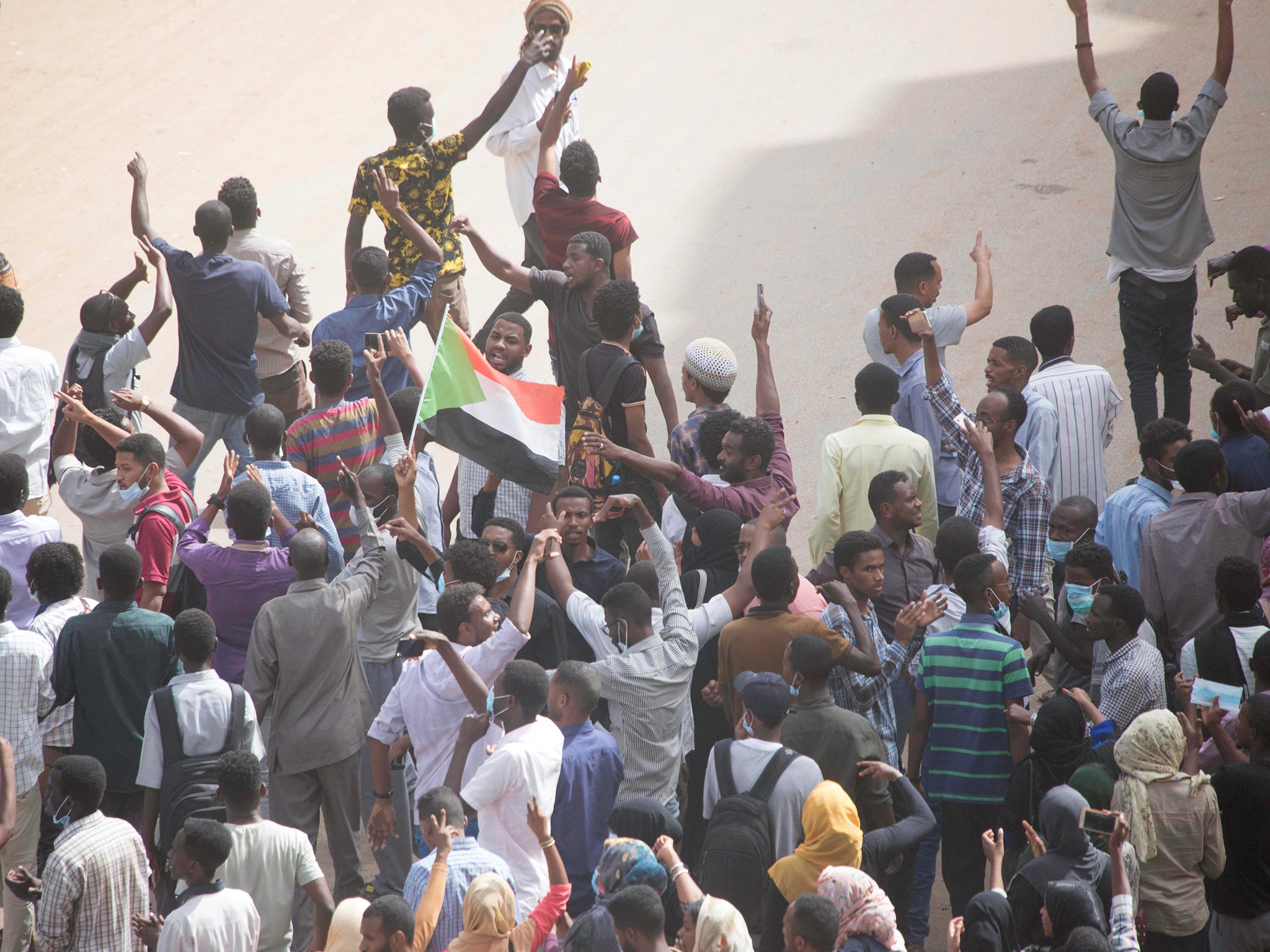Sudan’s leader Omar al-Bashir bans unauthorised gatherings during state of emergency
Move comes after two months of demonstrations against price hikes and president's nearly three-decade rule

Your support helps us to tell the story
From reproductive rights to climate change to Big Tech, The Independent is on the ground when the story is developing. Whether it's investigating the financials of Elon Musk's pro-Trump PAC or producing our latest documentary, 'The A Word', which shines a light on the American women fighting for reproductive rights, we know how important it is to parse out the facts from the messaging.
At such a critical moment in US history, we need reporters on the ground. Your donation allows us to keep sending journalists to speak to both sides of the story.
The Independent is trusted by Americans across the entire political spectrum. And unlike many other quality news outlets, we choose not to lock Americans out of our reporting and analysis with paywalls. We believe quality journalism should be available to everyone, paid for by those who can afford it.
Your support makes all the difference.Sudanese protesters have defied their embattled president's ban on unauthorised public gatherings, with hundreds rallying across the country to call for his resignation.
The protests came on Tuesday despite a state of emergency imposed on Friday by President Omar al-Bashir in response to more than two months of demonstrations against his nearly three-decade rule.
Nationwide protests erupted in December, initially over rising prices and shortages but quickly turned to calls for Mr al-Bashir to step down.
Tuesday's rallies were called by the Sudanese Professional Association, an umbrella of independent professional unions that has spearheaded the two and a half months of protests.
Video footage shows demonstrators, mostly women, marching in the streets of Khartoum's twin city of Omdurman. Demonstrations were also reported in the city of Atbara and the country's troubled Darfur region.
On Monday, Mr al-Bashir issued decrees giving security forces powers to search buildings, restrict movements of people and public transportation, arrest individuals suspected of crimes related to the state of emergency and seize assets or property during investigations, according to the state-run SUNA news agency.
The decrees included a ban on unauthorised trading and stockpiling fuel products and prison terms for those travelling with more than $3,000 (£2,300) in cash or 150g of gold.
The unions said the state of emergency was unconstitutional and that they would challenge it in courts. “We have one option, which is to win,” they added, calling for fresh protests against Mr al-Bashir.
“The ban is a desperate decision aiming at terrifying the protesters and their families,” said rights lawyer Amal el-Zain. “It may curb the uprising but will not stop it.”
Activists said on Tuesday that authorities have lifted a block on popular social media platforms that have been used to organise and broadcast the protests.
They said users of the three main telecommunications operators in the country – Zain, MTN and Sudani – have access to Facebook, Twitter and WhatsApp after nearly two months of restrictions during which users could only access the internet through a virtual private network, or VPN.
The government had blocked access to social media platforms shortly after protests erupted on 19 December, according to Salah Abdallah, the head of the country's National Intelligence and Security agency.
There was no immediate comment from authorities on the lifting of the blocks on social media and a government spokesman did not immediately respond to phone calls and messages seeking comment.
The current wave of unrest is marked by the most serious protests against Mr al-Bashir in nearly three decades of rule. Previous rulers faced with mass protests often turned to a state of emergency, which means deploying more troops – with fewer restraints on their behaviour – and erecting multiple roadblocks in an effort to control the civilian population's movements.
Mr al-Bashir himself has repeatedly declared an emergency in several provinces since 2011 in a bid to quell anti-government protests.
Along with imposing the state of emergency, which is to last a year, Mr al-Bashir disbanded the federal government and replaced all state governors with senior army officers. The order also gave security forces a free hand in cracking down on protesters and making arrests, and placed heavier restrictions on the press and opposition parties.
A joint statement on Tuesday by the US, Britain, Norway and Canada said they were “deeply concerned” about Mr al-Bashir's recent decisions to declare the state of emergency, impose a ban on unauthorised public gatherings and appoint military and security members to senior government positions.
“The return to military rule does not create a conducive environment for a renewed political dialogue or credible elections,” the statement said.
The moves by Mr al-Bashir, who seized power in an Islamist-backed military coup in 1989, further concentrated power in his hands and set the stage for a bloody crackdown on protests, said the International Crisis Group.
The group urged the US and the EU not to normalise relations with Khartoum if it “gives its forces carte blanche to kill and detain protesters”.
Mr al-Bashir's term expires in 2020; he has repeatedly promised not to run again. Without amending the constitution, he can't run for a third term.
Earlier this month, a parliamentary committee tasked with amending the constitution to scrap presidential term limits cancelled its meetings, a move that appeared to be the only political concession by Mr al-Bashir so far.
The unrest coincides with worsening economic woes that saw a currency devaluation, price hikes, fuel shortages and a steep rise in the price of bread, a main fare for most Sudanese.
Activists say at least 57 people have been killed in the protests. The government's latest tally stands at 30 killed, but figures have not been updated in weeks.
AP
Join our commenting forum
Join thought-provoking conversations, follow other Independent readers and see their replies
Comments